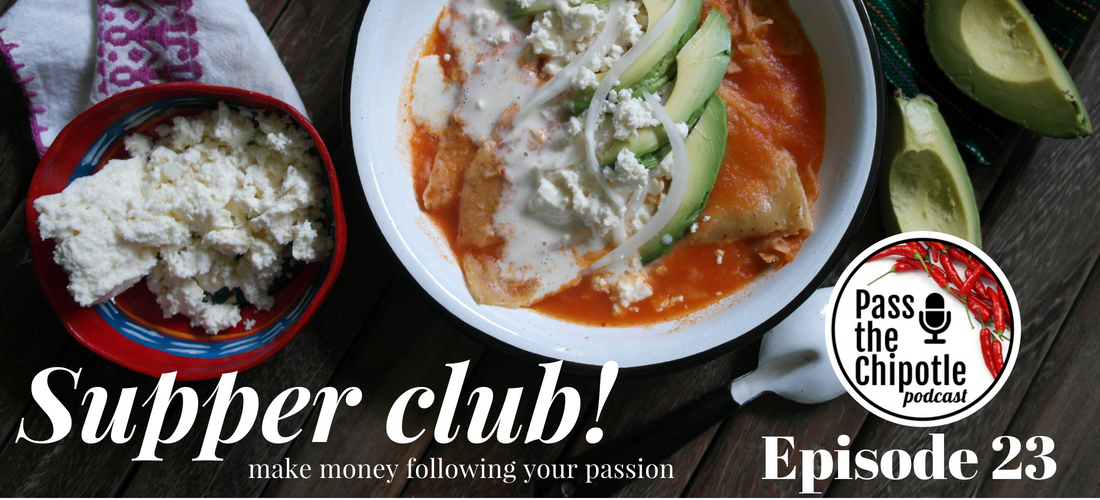
Supper clubs! Make money following your passion. Ep.23
Presented by: Rocio Carvajal Food history writer, cook and author.
Episode 23
On this episode, I talk about why supper clubs are a wonderful opportunity to develop your own business and make money following your passion.
perhaps you have you always dreamed of running your own food business, but with so many options available now from food trucks, takeaways and food markets is hard to know which is the right option for you.
Supper clubs disrupted the typical restaurant business model bringing together amazingly talented cooks with customers who want personalised and wonderful dining experiences without having to own a restaurant. Supper clubs have been embraced by celebrity chefs, non-profits, home cooks and entrepreneurs and have become an ever-growing global trend that for once is benefiting from many things that the free market has to offer, democratising the possibility for anyone to participate in the food industry.
Introduction
Many of you have heard your friends or seen people on social media raving about supper clubs, you see photos of dreamy venues and beautifully laid tables and a stunning string of neatly plated dishes. Just check the #supperclub on Instagram to see what I am talking about!
Supper clubs have been embraced by celebrity chefs, non-profits, home cooks and entrepreneurs and have become an ever growing global trend that for once is benefiting from many things that the free market has to offer, democratising the possibility for anyone to participate in the food industry.
The Supper club model is a textbook case of business disruption that brings together service providers and customers with the help pf through digital and social media platforms without having to own a restaurant.
Many listeners of my Podcast Pass the Chipotle I have requested that I share my expertise and walk them through this popular business that can perfectly become an extra source of income for talented home cooks who want to have a go at becoming food entrepreneurs, so with that in mind I created this guide to explain what is a supper club and how they came to exist, how does a supper club work, what aspects you need to consider before you start and some amazing free resources online and great platforms that will put you on the fast track of becoming a supper club host.
I have met interior designers, anthropologists, fine arts graduates, therapists, graphic designers, marketing managers and so many professionals that successfully run their supper clubs without having a cordon bleu diploma, but they take pride and discipline in their craft and make a profitable side business out of of a personal passion.
Now is the time to think outside the box, reach out to your local farmers markets, artisan bakeries or even food incubators to partner up with, learn from others, and capitalise your experiences.
I really believe that any home cook can become an extraordinary host, but you have to be ready to push yourself to learn and develop skills, take the challenge with seriousness and put your creative passion and business talent to join the global community of gastronomic ambassadors.
1. What is a supper club?
There is not much new to the idea of paying people to feed us, but the reasons why we choose to pay to have some else cooking for us are many, and they determine what, when and how we are willing to pay for it and know what to expect in return. Supper clubs are what you get if you strip off the business model of a restaurant, ask yourself this: what are you actually paying for when you go out to eat?
Running a restaurant is expensive, behind the prices on every item on a menu are the added costs of Staff payroll, gas and electricity bill, taxes, licensing, laundry, insurance, rent, training, uniforms, maintenance, marketing… and of course the actual ingredients of the food they serve. In short, only a small percentage of your bill is actually covering the food you just ate. Shocking right? So what if you take out all the fixed costs of running a brick and mortar restaurant, what are you left with? In essence: cooks and the great food they make. After all, the origins of the catering industry is someone with cooking skills willing to offer his or her services to people willing to pay for the privilege of being fed, Supper clubs extract the value proposition of the typical restaurant business model: offering memorable eating experiences at a profitable cost, reducing the added costs of running a restaurant and maximising the quality of the food and experience offered, keeping customers willing to pay for it time and time again.
And as it turns out not only trained chefs can be amazing cooks, for every culinary school graduate there’s literally thousands of equally passionate and hugely talented self-taught and traditional cooks in the world that have found in the supper club model a perfect opportunity to enter the food industry with a low-risk approach, cutting off the obstacle of owning a restaurant and use their means available to offer themed-based dining experiences to guests that will come to their home and enjoy a great night in a friendly and relaxed environment, with the added value of actual human interaction and the personal care and attention of the cook to each and every one of the guests.
You can also say that in the supper club business model the profits (that come from sold tickets) go straight to the cook (that is you!) right from the guest’s pocket. Did you just notice that I used the word guest and not customer? Well, there’s a good reason why and let me explain to you why in the next section.
2. The evolution of supper clubs
There is a lot of debate as to where to pin down the actual origins of modern supper clubs, while some say they have existed since roman times when thanks to word of mouth travellers shared the knowledge about private homes who would take in guests and feed them in exchange of some money. Around 2008 the so called underground restaurants began making the news, they didn’t have defined name, and there was no articulated marketing platform, meaning it was mainly through word of mouth that people came to know about such dining experiences.
Urban legend has it that it was a handful of Latin American immigrants in London who after constant praise from their friends they decided to promote a dinner-party like event with their acquaintances and offer a menu with classic traditional dishes from their homelands, they prepared their own dining room to welcome a few guests and charged a reasonable fee in exchange for a soiree of unapologetically delicious food and the extra fun to get acquainted with strangers that by the end of the evening ended up as friends.
A few years later came the boom of social media, enabling us to instantly share with millions what a good idea these hidden restaurants were, and in no time, the offer of such experiences spiked, offering all sorts of national cuisines, themes and hosts began using unorthodox venues such as rooftops, terraces, barns, al fresco sitting, you name it. And before you know it, the term supper club was coined, which resonates more with the actual nature of the business as they are not actual restaurants and evolved from the idea of a dinner party, remaining intimate and flexible enough to adapt and cater for special requirements. Supper clubs have evolved very rapidly and nowadays you can find all sorts of themes, some even offer mixed services as yoga or meditation sessions and a brunch or a live performance by musicians, many have specialised in certain diets becoming more and more niche, and hosts are increasingly expected to have a signature style and personal brand to his or her menus, ambiance, location and overall experience.
It was London, England where supper clubs first became significantly popular and rapidly embraced as a trendy favourite of the middle class, and there are many reasons to explain why that happened, namely because you can:
● Experience world foods without travelling.
● Meeting experienced talented home cooks that will introduce you to their national cuisine through handpicked emblematic dishes.
● You will meet like-minded people that broadly share the same values with you when it comes to favouring authenticity, supporting local entrepreneurs and having an open mind and positive attitude towards cultural exchange, and you don’t have to put up with stiff restaurant etiquette and relax in an intimate and friendly atmosphere.
3. How does a supper club work?
What makes a supper club different from food trucks, takeaways and market stalls is that supper clubs are about actually sell unique dining experiences, remember, think dinner party but with paying guests. Although every supper club host has their own particular workflow, I will share with you how I run mine, I have perfected it over the years and changed what works for me and hopefully, it will work for you too:
1. Have a venue for your event and the exact number of guests you’ll be able to sit comfortably and choose one or several dates.
2. Have a booking and payment method.
3. Decide what kind of menu you will offer, with dishes you are confident cooking, do not try last minute improvising.
4. Make a budget according to your menu’s ingredients and include all the expenses you’ll have to make, such as transport, gas, electricity, decoration, printed welcome cards, etc, and an extra pair of hands if necessary.
5. Set a price for your tickets.
6. Have a marketing strategy in place: prepare social media posts, a press-release like document presenting the event, the details of the menu and the occasion. You can even come up with a hashtag and suggest your guests using it.
7. Make and follow a logistics plan for your evening.
8. And on the day of the event make sure you have all you need to offer a seamless event, including explaining the logistics to the people that will help you, prepare an assembly line to plate and rehearse.
9. After the event ask your guests to provide reviews and feedback.
As I said before, the aim is to create a relaxed dinner party-like experiences, for many of your guests it will be the first time they try the food you are offering, and since a supper club can be a good proxy of a foodie trip make sure you share about your culture and yourself when you are ready to start the evening, introduce each dish, talk about food traditions in your country and tell them what is so special about the dinner they are enjoying.
Remember, just because supper clubs are unique events with a sort of relaxed aura as opposed to a restaurant, make sure you approach it with all the professionalism, care and attention it requires for you to succeed.
4. My secrets to run an amazing supper club
Now we come to the key aspects that will ensure the success of your supper club, I pride myself on being very organised and have learnt a few good lessons along the way, so pay attention to these aspects and I assure you it will save you time, money most importantly will stressing out in vain.
1. Nowadays there are dozens of online platforms that provide a way to advertise, book, manage, and receive payments for your events, using a booking service will save you the hassle of collecting money from guests and by creating an account and a profile you will also get reviews. But if you prefer to keep it simple, there is nothing wrong with taking cash from your guests, just make sure it is suitable for everyone.
2. Finding the right venue. I’ve met many supper club hosts that have partnered with local cafes, restaurants, yoga studios, botanical gardens and other locations to rent a space for a few nights a month, this is a huge help to have all the equipment you need, tables, chairs, toilets, etc. But some others prefer doing smaller supper clubs or even brunches at their homes, they know their space, no worries about transporting ingredients, you will ensure a perfect home environment and feel more in control of the situation.
3. Do your research to best source your ingredients, visit your local wholesale and farmers’ markets, fishmongers and butchers, you can get great quality products at good prices, and you might even be able to get discounts or deals if you make regular purchases.
4. The menu is the backbone of your event, so be adventurous but also realistic, I have offered both: fixed menus and multiple choice menus with vegan, vegetarian and allergy-friendly options, my advice keep it simple, don’t overestimate your timings, trust me, it can be very stressful, I am more inclined now to offer fixed menus with 2 dessert options, is far more manageable, especially if is a large crowd.
Don’t feel forced to offer all dietary options but you have to specify the details of your menu, people deserve to know upfront what they are paying for.
5. It is very important to have an attractive, functional and professional-looking online presence, prepare amazing photos of your dishes, and obviously serve them as beautifully as you are selling them.
6. Think of what kind of experience you’d like to offer and be realistic about it, it can be homestyle menu from your region or country of origin, a themed centred experience, namely a harvest feast, Ramadan night, Hanukka dinner, St. Patricks day, Cinco de Mayo fiesta, you name it, but make sure you will be able to have all the ingredients you need practice your recipes and plating styles.
7. Prepare the venue: if you are hiring a venue, pan a visit the place in advance and get familiar with the facilities, ask about equipment and rules, plan and prepare your decoration, you can use low-cost props to make it look cozy and welcoming, such as tea lights, flowers, bunting, fairy lights, etc. I always use a themed playlist with tracks suitable for the occasion, it creates a good atmosphere and encourages people to talk and relax.
8. If you are doing your event at home, be sure to have everything spotless, make sure all the facilities work, from coat hangers to toilets, lights, chairs, etc. Offer your Wifi password so they can share it all live social media, and ask them to tag you.
9. Take some time to look your best before the evening starts. People expect quality and human touch so make every guest feel special by welcoming them personally if possible, be friendly and chat a little bit with all your guests.
10. And last but not least, keep track of the lessons learnt, and never, ever, EVER underestimate good planning, and preferably have at least one unconditional person to help you, in time you might need more hands to make it all work, this will make you feel more relaxed, after all, you are supposed to enjoy it too!
5. Legal aspects to consider
License to operate
● If you decide to run your supper club from home, in the UK there is a procedure to be able to run your own business from home, you need to apply to the Food and Standards Agency please check the link to see the requirements. Which is why many people opt out to partner up or rent already- established venues, I recommend doing google searches with the terms “pop up venues in my area” or “commercial kitchens for hire”.
Don’t miss out the chance to present the idea to local cafes and small restaurants, yoga and artists’ studios, you’ll be surprised to see how open they can be to diversify their offer.
● Another advantage to have a fixed venue for your supper club is that you can get it listed on services like tripadvisor, google, and yelp. Business owners in the time of social media know the value of good reviews, feedback and transparency, this will make your potential guests to reassured and positive that they make the right choice by booking an event with you.
B.Y.O.B.
● Home-based supper clubs and certain venues might not qualify to offer alcoholic beverages during the events, which is why hosts specify guests to cater for themselves using the acronym B.Y.O.B. which stands for Bring Your Own Bottle/ beer/ booze this is a great solution and in most cities is perfectly legal, I myself provide a list of drinks to pair with each course on my menus.
Since many restaurants actually have a licence to serve alcohol, I encourage you to corroborate this with the person in charge and consider the chance to offer drinks as part of your event.
The last thing you want is to deprive people from enjoying a nice drink with your lovely food, also, between you and me, in most occasions it can also be the best social lubricant.
6. Supper club checklist
⃣ Set your venue and date (s)
⃣ decide on the No. of guests
⃣ Define Menu
⃣ List of decorative items you will need (candles, flowers, napkins, etc)
⃣ Calculate the total of ingredients you’ll require per recipe
⃣ Make an expenses spreadsheet (don’t leave out gas, transport, even tin foil and extra containers!, extra help, venue hiring, etc,)
⃣ Define your final budget
⃣ Set the tickets’ price
Marketing:
⃣ Submit information to your chosen booking platform or your own website
⃣ Update your website with the upcoming events
⃣ Write and schedule newsletters
⃣ Prepare and share promotional images and event info on social media, tag your local “what to do” guides
⃣ Confirm your bookings and payments
⃣ Prepare a spreadsheet with the night’s logistics
—————————————–
Follow me on twitter: @chipotlepodcast + @rocio_carvajalc
Instagram: @rocio.carvajalc
email: hello@passthechipotle.com
web: passthechipotle.com










